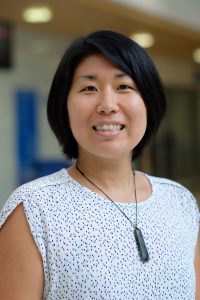Please tell us about your career pathway to date (positions and institutes).
My journey as a physical activity researcher started in Japan where I trained as a physical education teacher and sport scientist. During this time, I chose to become a researcher rather than a teacher so that I might be able to contribute to changes in the systems and structures of physical education and sports. I decided to move to New Zealand to advance my knowledge in physical activity, where I completed a Master of Health Science at Auckland University of Technology (AUT). A year after working as a Research Assistant in the area of active travel and the built environment, I was awarded a scholarship and started my PhD journey at AUT looking at associations between environmental attributes and children’s active travel to school. In 2019, I moved to the UK and started working as a postdoctoral fellow at the MRC Epidemiology Unit and the Centre for Diet and Activity Research in University of Cambridge.
How would you briefly describe your current research/job to someone who is not familiar with your field of study/work? What is your main research interest?
My current research explores ways to promote physical activity and wellbeing in children and young people. I am especially interested in:
- Understanding different forms of physical activity (e.g., active travel, organised sports and physical education) and their contribution to moderate-to-vigorous physical activity in children and young people; and
- Identifying mental and physical health problems among school staff that might impact on students’ wellbeing, and strategies for promoting wellbeing for school staff.
What are the main barriers you encounter/experience when conducting research, or what information/skills do you lack to conduct high quality research?
There are always challenges when conducting research (e.g., getting ethics approval, collecting participants’ data, managing and analysing the data). But I have learned a lot from these challenges – for example, understanding the ‘language’ and ‘perspectives’ of stakeholders as well as researchers from different disciplines. I have also developed various skills such as leadership, communication, time management…the list goes on! I would like to highlight that I have had great teammates (colleagues, mentors) when facing these challenges, and they have undoubtedly heled me throughout. I am so thankful to many people who have helped me along the way, but particularly my fabulous supervisors and mentors – Professor Erica Hinckson (AUT), Associate Professor Melody Smith (University of Auckland) and Dr Esther van Sluijs (University of Cambridge). I believe that great teamwork is a vital ingredient in successfully conducting high quality research.
What could help you as a student/ECR to further develop/grow in your current position?
Networking, collaborating, mentorship and professional development opportunities could all help me learn new skills and broaden my horizons. Until my current position, I did not know a lot about these opportunities, particularly those targeting students and ECRs (e.g., ISBNPA NESI). These events are now more accessible and flexible in response to the COVID-19 – ‘virtual’ events allow affordable/free registration and recordings (having said that, I miss face-to-face events which I think more interactive). Through these events, I received benefits of building new networks and collaborations with other institutions. I would like to learn from and collaborate more with peers in the ECR community.
What do you think will be the next most important development in the nutrition and/or physical activity field?
Such a tough question! If I could choose one in relation to physical activity, I would say the development of national and global surveillance and monitoring systems for physical activity to enable evidence-informed guidelines and action plans. Low- and middle-income countries may benefit most from this, where there is a need for device-based measures for physical activity at a population level.
I also think patient and public involvement (PPI) can play an important role in developing research ‘with’ and ‘by’ people (rather than ‘to’, ‘about’ or ‘for’ them). It is more likely that research using PPI can build capacity for individuals and communities, and produce long-term benefits. I would like to use this method in my future research (e.g., school staff).
You can get in contact with Erika via email at erika.ikeda@mrc-epid.cam.ac.uk or Twitter @DrErikaIkeda


